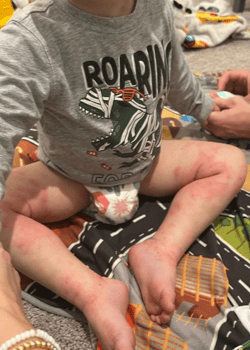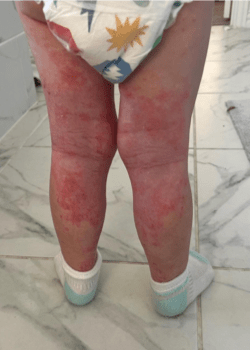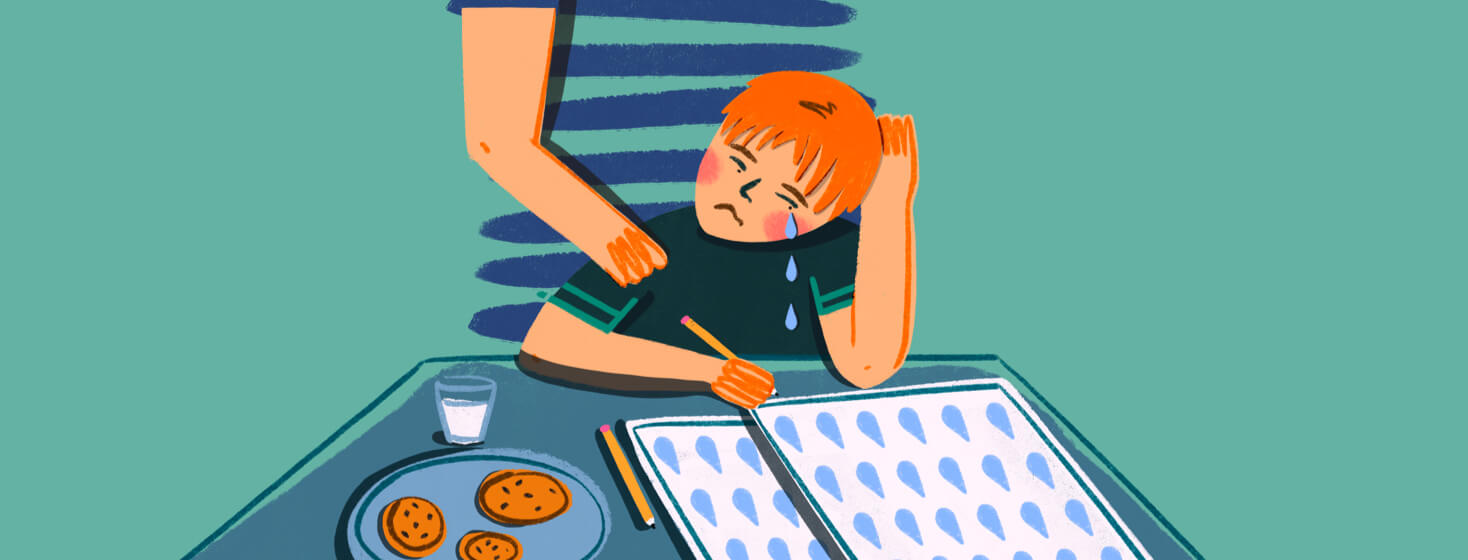The Daily Routine: The Moore Family
Dealing with your own skin crisis is one thing, but being a parent to a flaring toddler is absolutely another! But one family, the Moore's, have graciously thrown the front door wide open to raise awareness to help other parents feel less alone.

Lindsey, the mother of Cooper (2), describes how differently their lives run as they navigate his poor skin.
How has going out changed?
"We used to get out a lot more," she began, a normal way of living slowly slipping away. Cooper had a set schedule: Preschool 3x a week, a chill Monday and Friday, and church on Sundays with the family. "We would often go out to brunch after as a family." However, with his now deteriorating health, they never go out to eat.
How has Cooper's diet changed?
In order to save Cooper from his growing allergies and food sensitivities, they are working with integrative doctors and a program that has Cooper on a very restrictive diet - gluten free, dairy free, egg free, peanut free, and almond free. This way of life also makes it difficult to go to other social gatherings, like birthdays and holiday events.
What is the usual morning routine now?
"We had to take him out of preschool because his eczema was flaring so often, and we were worried about staph," Lindsey shares. Instead of being with his peers, Cooper first plays on his iPad while eating breakfast, a smart strategy to keep him distracted while Lindsey mentally and physically prepares for the day. "He gets more screen time than I would like," she expresses, "but he doesn’t have much energy in the mornings and is very uncomfortable."
After screen time, he either retires to his bedroom to play with blocks, dinosaurs, and toys of that nature, or he gets to play outside with his brother on the warmer days. Because he stays home most days, she makes him lunch and puts him down for a nap in the afternoon. It is then she must retrieve her daughter from school, which is Cooper's second play mate after his nap.
What is the nighttime routine?
Once dinner time strikes, so does the skincare.
"He takes a bath about 2x a week and soaks in the Dead Sea Salts for about 10-15 minutes," Lindsey states. Afterwards, she gives Cooper some liquid magnesium, but if the itch is too great, some Zyrtec or Genexa. No moisturizers are applied since Cooper hates them. And as for pajamas, he wears bamboo footed pajamas and a toddler sleep sack to keep him from itching. But once he falls asleep, that is when the action starts.
What do overnights look like?
"On a typical night, we can hear him 3-4 times, but on bad nights, he wakes up hourly, sometimes just crying in his sleep. Other times, he will be in full itch mode - ripping his sleep sack off so he can itch his legs and feet. The days are slow and very low-key, but the nights are super eventful and exhausting."
What impact has eczema/TSW had on the family?

"As a mother, I was already struggling with postpartum anxiety," Lindsey vulnerably shares, "and this past year has been difficult for both my husband and me." This poor partnership, having to tap in and out and night as to who will take care of Cooper, leaves them with little sleep and little patience.
Do others understand and help?
"It has been demoralizing, and we do not feel like we have a lot of support outside of our parents. People don't understand the toll it has taken on us or how it's impacted Cooper."
It is very hard for outsiders to understand the ramifications of severely broke out skin, simply because they have no idea what takes place behind closed doors. Sleep deprivation can bring on a slew of health conditions and concerns for everyone, rest being imperative for optimum physical, emotional, and mental stamina.
What has helped keep a balance?
"Oh man, I wish I had a better answer to this," she divulges. I do, too. There really is no easy answer.
"Honestly, just learn to turn off your phone." Lindsey brings up valid points when needing to disconnect with the eczema and topical steroid withdrawal community online. It can send many of us into a deep hole, spiraling into traumatizing photos and anecdotes. But, Lindsey wishes to do her due diligence and read up on as much research as she can in hopes of helping Cooper. It just needs to be paced out. "Set a time," she recommends, "on when to learn about eczema and then be done and move on with your day."
Any advice for other parents?
"Trust your gut and do your research. If something doesn't feel right get a second and third opinion. You are the expert as the parent. You know your child better than any health provider." I hear this sentiment a lot in the parent groups. I couldn't agree more.
Lindsey also reminds us to lean on community and to know we are not alone, encouraging others to find a support group. But, finally, to never give up. "Your child will heal. Keep fighting, one day at a time."
Thank you, Moore family!


Join the conversation